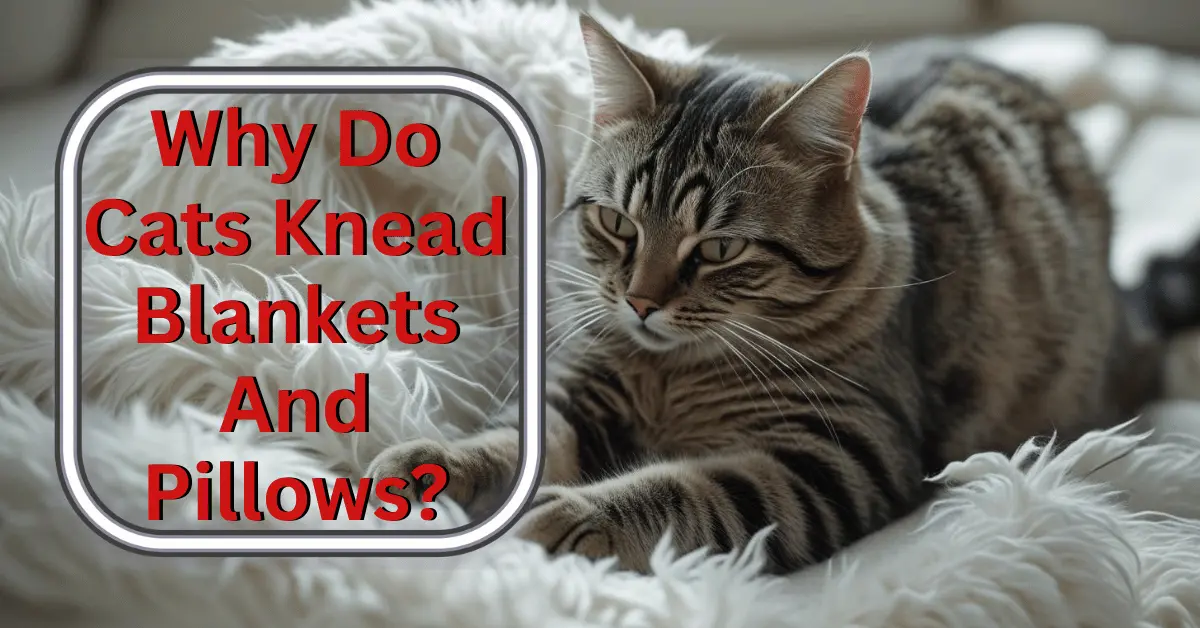You’re relaxing on the couch when your cat hops up, settles into your lap, and begins pushing its paws rhythmically into your soft blanket or pillow. It’s cute, soothing — and a little mysterious. Why do cats do this?
This behaviour, known as kneading, is one of the most fascinating aspects of feline body language.
1. A Comforting Instinct from Kittenhood
Kneading begins during kittenhood, when kittens press their tiny paws against their mother’s belly to stimulate milk flow. This rhythmic motion becomes linked to feelings of warmth, safety, and nourishment.
Even as adults, cats continue kneading as a way to self-soothe and recreate those early sensations of comfort. When your cat kneads your blankets, pillows, or even your lap, it’s often a sign that they feel secure, relaxed, and content in their environment.
Related: Why Do Cats Meow at Night? 4 Fascinating Explanations
2. Marking Their Territory
Cats have scent glands in their paw pads, and when they knead, they release pheromones that subtly mark objects — and even people — as their own. This is a natural way for cats to establish a sense of ownership and security in their environment.
So, if your cat kneads your favourite blanket or pillow, it’s their way of claiming it as theirs. And when they knead on you, it’s an even stronger gesture — a sweet sign of affection, trust, and belonging.
3. Preparing a Cozy Sleeping Spot
In the wild, cats pat down grass or leaves to make a comfortable nest before resting. Domestic cats retain this ancient instinct. Kneading soft pillows, blankets, or your lap mimics preparing a perfect sleeping spot.
If your cat kneads right before curling up, it’s their natural way of creating a safe and cozy environment.
4. Showing Love and Trust
Kneading can also be an expression of deep affection. When cats knead on you or your belongings, it often means they love and trust you. Here’s what it typically signifies:
- Affection: They associate your scent and presence with comfort.
- Trust: Cats don’t knead around people they fear or dislike.
- Bonding: Kneading strengthens their connection with you.
So, when your cat kneads you, take it as a sweet reminder that they feel safe and secure in your company.
5. A Sign of Relaxation and Happiness
Many cats knead when they’re at their happiest. If you notice your cat kneading while purring softly with half-closed eyes, it’s a sign of complete contentment.
This soothing, repetitive motion works as a form of self-relaxation, helping cats manage stress and stay calm.
6. How to Manage Excessive Kneading Without Stressing Your Cat
While kneading is harmless, some cats can become overenthusiastic, using their claws or damaging fabrics. Instead of scolding them, try these tips:
- Provide a kneading blanket: Redirect them to a soft, dedicated spot.
- Trim their claws regularly: Prevent damage to your furniture and clothing.
- Distract with toys: Offer interactive play sessions when kneading gets intense.
Related: Why Do Cats Sit on Laptops and Books? 3 Hilarious Reasons
7. Why Cats Knead and Bite Blankets
Some cats not only knead but also gently bite blankets or pillows at the same time. While it may seem strange, this behavior is actually quite common and usually harmless.
Rooted in Kittenhood
This combination of kneading and biting often goes back to nursing behavior. As kittens, they knead their mother’s belly while feeding, and the mouth and paw movements work together. Many cats carry this instinct into adulthood, especially when they feel safe and content.
What It Usually Means
- Comfort and Security → It reminds them of the warmth and safety of kittenhood.
- Emotional Relaxation → Cats do this when they’re deeply at ease.
- Self-Soothing → It’s a calming mechanism during stress or rest.
Not a Sign of Aggression
While biting might sound alarming, this behaviour is rarely aggressive. Instead, it’s your cat’s way of expressing affection and contentment, often paired with purring and half-closed eyes.
8. Should You Ever Stop a Cat from Kneading?
In most cases, kneading is completely natural and harmless. However, if it becomes destructive:
- Place a thick blanket on your lap to protect yourself.
- Offer designated kneading toys or beds.
- Avoid punishing your cat, as it can create stress and anxiety.
9. When Kneading Might Signal a Problem
Kneading is usually harmless, but when it becomes excessive and is paired with other behaviors, it may point to stress or health issues.
Signs of Stress or Anxiety
If your cat kneads constantly along with over-grooming, restless pacing, or loud vocalizations, it may be reacting to anxiety or changes in its environment.
Possible Health Concerns
Sudden shifts in appetite, sleep, or energy levels combined with increased kneading can sometimes signal an underlying medical problem. In these cases, a vet visit is the best way to rule out health concerns and ensure your cat’s well-being.
Frequently Asked Questions
Why Does My Cat Knead Before Sleeping?
It’s an instinct inherited from their wild ancestors who softened their resting spots before lying down.
Why Does My Cat Knead Me But Not Others?
Kneading you specifically shows trust and attachment. You’re their safe space.
Why Does My Cat Knead And Purr At the Same Time?
Kneading often accompanies purring because both behaviours are linked to relaxation and happiness.
Is Kneading Ever Linked to Stress?
Yes, in rare cases, excessive kneading may indicate anxiety or insecurity, especially if combined with pacing or vocalizing.
Conclusion
Kneading is one of the most adorable and instinctive feline behaviours. From kittenhood memories to marking territory and expressing love, it’s a window into your cat’s emotional world.
By understanding why cats knead blankets and pillows — and learning how to manage excessive kneading gently — you can strengthen your bond and ensure your furry friend feels safe, happy, and secure.


2 thoughts on “Why Do Cats Knead Blankets and Pillows? 5 Surprising Reasons”